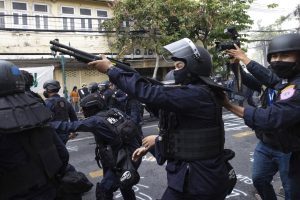Prayut Chan-o-cha was in high spirits. “I didn’t join the Songkran celebrations since I became a soldier… I feel refreshed,” said Thailand’s Prime Minister, a surprise participant in “world’s biggest water fight” heralding the Thai New Year. The annual free-for-all had resumed after a three-year break due to COVID-19. Wearing a Hawaiian shirt, Chan-o-cha squirted passersby on Bangkok’s Khaosan Road with a colorful Super Soaker.
The ex-army chief’s water gun was a throwback to his military days: a replica of a large pump action firearm.
Thailand has a deep-rooted, unabashed love of guns. Public displays of real or fake firearms do not typically raise eyebrows in the majority Buddhist nation. Every January, on National Children’s Day, youngsters are invited to army bases to get acquainted with heavy-duty weapons of war.
Lately, however, some civilians have begun to voice their disapproval. Commenting on photos of children wielding assault rifles and other firearms, Boonwara Sumano, a social scientist at the Thailand Development Research Institute, asked: “What type of values are we implanting into our nation’s future?”
Such questions have become more urgent since Thailand’s deadliest mass shooting at a government-run childcare facility six months ago. The brutality of the attack in Nong Bua Lamphu province shocked the country: the victims, mostly young children, were killed in their classroom during nap time. The shooter obtained his semi-automatic weapon legally. “When I learned it was an ex-policeman who carried out the nursery attack, I thought, ‘When will they ever have stricter gun laws for these men in uniform?’” raged a survivor of the 2020 carnage perpetrated by a disgruntled soldier.
Mass shootings in Thailand are rare, but petty gun incidents occur with startling regularity. Last December, a man in Ranong province fired 18 shots at a primary school, annoyed by the sound of children’s voices during morning assembly. Shoot-outs between tuk-tuk drivers, irate gun-toting customers at grocery stores, or violent road rage incidents are irresistible fodder for TV news channels. One weapon-owning politician lamented, “People pull out their guns at a moment’s notice.”
The U.S. State Department reportedly took note in 2013, advising staff, “Thailand has a fervent gun culture on par with the United States.” But as The New York Times points out, there are fundamental differences between the two firearms-obsessed nations. Owning a gun is not a political statement in Thailand; instead, it confers prestige: “Like other status symbols, guns are what some have and many want.”
Over the years, a militarized political establishment has presided over the proliferation of legal and illicit firearms. One academic summarized the situation: “With Thailand having had 14 coups since 1932, the military and police are ubiquitous – and so are their guns.” For the average citizen, guns are expensive and difficult to obtain. However, government officials can buy unlimited numbers of highly subsidized firearms for self-protection through programs like the “gun welfare” scheme. In a scathing critique following the recent mass shooting, the Bangkok Post argued that the much “abused” perk had turned into a de facto pipeline to the underground market.
Trafficking in firearms has long been a lucrative side hustle for Thai security personnel. In 1998, economist Pasuk Phongpaichit’s bestselling expose “Guns, Girls, Gambling, Ganja: Thailand’s Illegal Economy and Public Policy” delved into the illicit weapons trade. She found leading politicians and military officers had funneled U.S.-made weapons from the Thai army’s stockpiles to the underground market. “The contraband arms trade still exists because influential people are involved,” she wrote. Recent raids and arrests are a reminder that the siphoning of guns from the military continues to be an ongoing problem.
At last count, Thailand had over 10 million guns, of which only 60 percent were legal. The rate of weapons ownership is the highest in all of East and Southeast Asia. The Buddhist kingdom is a clear outlier in a continent where civilians rarely possess guns.













